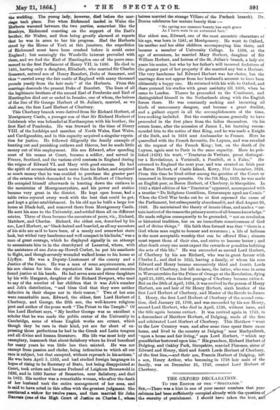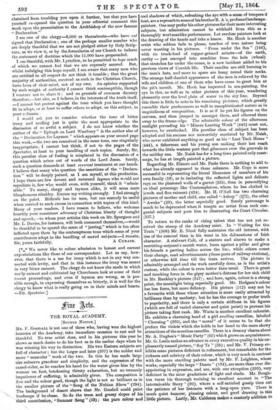THE OXFORD DECLARATION.
To THE EDITOR OF THE "SPECTATOR." SIR,—There was a hint in one of your recent numbers that your columns had been sufficiently occupied already with the question of the eternity of punishment. I should have taken the hint,
abstained from troubling you upon it further, but that you have yourself re-opened the question in your editorial comment this meek upon the presentation to the Archbishop of the now famous " Declaration."
I am one of the clergy-8,000 or thereabouts—who have not signed that Declaration; one of the perhaps smaller number who are deeply thankful that we are not pledged either by Holy Scrip- ture, as we view it, or by the formularies of our Church to indorse the statement of doctrine which the 11,000 have propounded.
I am thankful, with Mr. Lyttelton, to be permitted to hope much of which we cannot feel that we are expressly assured. But, whilst indulging this hope myself, I am aware that many men who are entitled to all respect do not think it tenable ; that the great majority of authorities, received as such in the Christian Church, have been of their mind, not of my own. An opinion supported by such weight of authority I cannot think contemptible, though I venture not to share it ; and on grounds of common decency therefore,—but also, as I believe, in the interests of the truth itself, —I cannot but protest against the tone which you have thought fit to adopt, or at least to suffer others to adopt, on this subject, in your columns.
I would ask you to consider whether the tone of bitter irony and scoffing jest is quite the most appropriate to the discussion of so awful a subject. I do not know whether the author of the" Epitaph on Lord Westbury" is the author also of the "Declaration for Laymen" which appears on your second page this week, —the two are conceived in the same tone, one singularly inappropriate, I cannot but think, if not to the pages of the Spectator, at least to your handling of such topics. Surely, Sir, this peculiar class of fooling is misplaced in the discussion of a question which arises out of words of the Lord Jesus. Surely, such a question demands at least reverent treatment at our hands. I believe that many who question the assertions of the " Declara- tion " will be deeply pained, as I am myself, at this production. I hope there are few devout and reverend laymen who would not repudiate it, few who would even, with yourself, think it "admis- sible." To many, clergy and laymen alike, it will seem mere blasphemous ribaldry. Excuse my writing strongly. I feel strongly on the point. Ridicule has its uses, but can scarcely be useful when carried to such excess in connection with topics of this kind. Many of your readers, I have reason to believe, who welcome heartily your consistent advocacy of Christian liberty of thought and speech,—to whom your articles this week on Mr. Spurgeon and Mr. L. Davies, for instance, will both commend themselves,—would be thankful to be spared the sense of "jarring," which is too often inflicted upon them by the contemptuous tone which some of your contributors adopt in the handling of sacred subjects.—I remain,
[10,,,* We never like to refuse admission to honest and earnest expostulations like those of our correspondent. Let us say, how- ever, that there is a use for irony which is not in any way con- nected with levity, and that in this instance the irony was meant in very bitter earnest. The clergy do not know the mode in which really earnest and cultivated lay Churchmen look at some of their recent proceedings, and even if laymen are wrong, as is pos- sible enough, in expressing themselves so bitterly, it is well for the clergy to know what is really going on in their minds and hearts. —ED. Spectator.]































 Previous page
Previous page